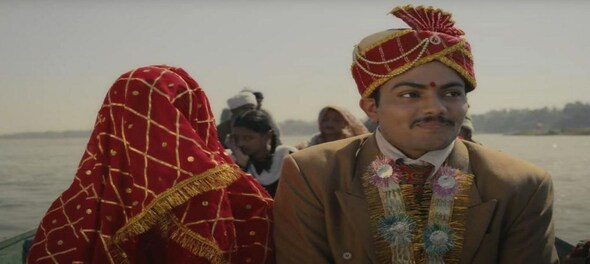
It’s a terrific week for cinema. Several magnificent, mind-bending Oscar nominations have finally found their way to Indian theatres. Then there’s the majestic Dune: Part Two, the gorgeous sequel to Denis Villeneuve’s 2021 blockbuster. Also playing alongside are a slew of small-budget but large-hearted Hindi films. Varun Grover’s directorial debut All India Rank, Karan Gour’s Fairy Folk, and Kiran Rao’s Laapataa Ladies.
The story of two young brides who get lost on the way to their husband’s homes, Laapataa Ladies could easily have been a horrific crime drama in a world overrun with gender violence. But Rao will not have it. Returning to the director’s chair after 14 years since her maiden outing Dhobi Ghat (2010), she chooses to tell a tender tale of hope instead.
Set in the rural Indian heartland in a fictitious state called Nirmal Pradesh, Laapataa Ladies follows Deepak (Sparsh Shrivastava) as he unwittingly brings home Pushpa (Pratibha Ranta) mistaking her for his bride Phool (social media star Nitanshi Goel). The root of the folly is the identical veil that both Pushpa and Jaya had covered their faces with while traveling in the same train compartment.
The result is a comedy of manners. It is 2001. Mobile phones are rare, veiled women aplenty, and opportunities for them, none. As Pushpa settles in with Deepak’s family, Phool—stranded at the railway station she finally deboards at—finds unlikely companions in a platform urchin and a middle-aged woman called Manju (Chhaya Kadam), who runs a tea stall at the station.
Lovelorn and grief-stricken, Deepak files a complaint at the local police station. The officer in charge Shyam Manohar (Ravi Kishan), easy with bribes and always chewing paan, is a little bemused at the incredulity of Deepak’s predicament but sensing that it could turn out to be lucrative, he decides to help.
The motley quartet that forms the two central couples couldn’t be more different. Sheltered and submissive, Phool has a child-like naivete about her. Whereas Pushpa is smart, enterprising, somewhat more educated, and therefore, aware of her agency. Moreover, she is up to something. Deepak, meanwhile, smitten with Phool, is searching for her relentlessly, aching to reunite with her. Not Pushpa’s husband though. He’s the textbook template of appalling.
Written by Biplab Goswami (original story), Sneha Desai (screenplay and dialogue), and Divyanidhi Sharma (additional dialogue), Laapataa Ladies is acutely aware of its milieu and stays firmly grounded in it. The detailing is delicious, the wins small, but precious. Jaya’s effect on the women in Deepak’s family is not too dissimilar to Rani’s on Rocky’s mother and sister in Karan Johar’s Rocky Aur Rani Kii Prem Kahaani (2023).
But here, no one breaks into rebellious singing or dramatic dialogue. The tiny steps toward self-actualisation are more rooted, life-like, within the boundaries of who each of these people inherently is. A bhabhi takes to a forgotten hobby again, a mother realises that she can cook for herself too.
Even Phool’s journey of self-awakening at the hands of a hardened Manju isn’t drastic. At the beginning of the film, she refuses to take her husband’s name, taught as she is to learn to look down and not ahead, among other problematic preachings of patriarchy. But when in the climax she finally does, it feels like a victory as momentous as any. Manohar too undergoes change but never crosses the boundary of believability. Laapataa Ladies is inherently feminist, but not the bra-burning kind.
At 125 minutes, this film is a winner, highlighting the desperate need for simple, gentle, unassuming stories in a cine-scape oversaturated with loud, violent patriotism and machismo. But its biggest triumph is its endearing cast. Each actor is a revelation.
Nitanshi Goel plays Phool with such soft innocence, that she makes you want to protect her, see her home. Pratibha Ranta is great as Pushpa too, rejecting the cards she’s been dealt with, courageous enough to want to carve her own destiny. Even Chhaya Kadam is terrific as Phool’s reluctant mentor, playing an iteration of her role in Nagraj Manjule’s seminal 2016 mega-hit Sairat. So is Ravi Kishen as a cop too kaleidoscopic to slot.
But my favorite performance in the film is Sparsh Shrivastava’s. He plays Deepak with such sweet earnestness, that you want him out of his misery just as much as he does. Watch out for a flashback scene in which he says I love you to Phool for the first time.
What he feels for her is so potent, that he almost explodes under its weight. The way he is written and performed, you know it’s women who have created him. At a time when films like Animal make ₹900 crore, we need more men like Deepak. In our films and our lives.
Check out our in-depth Market Coverage, Business News & get real-time Stock Market Updates on CNBC-TV18. Also, Watch our channels CNBC-TV18, CNBC Awaaz and CNBC Bajar Live on-the-go!


Prajwal Revanna Sexual Assault Case: Activist raises concerns over political interference, delayed investigation in the matter
Apr 30, 2024 10:17 PM
Lok Sabha Election 2024: Baramati election outcome will decide the future of Pawar dynasty, says expert
Apr 30, 2024 10:08 PM
Lok Sabha elections 2024: Baramati to Mainpuri, key battles in phase 3
Apr 30, 2024 7:01 PM

